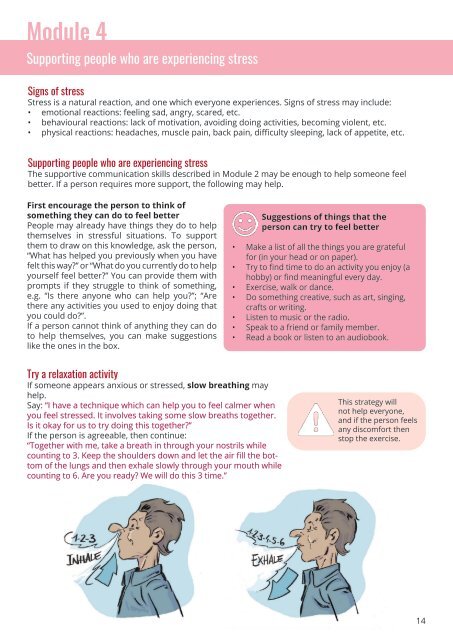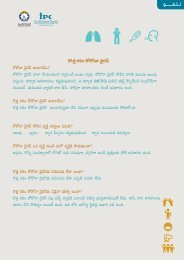WHO - Basic Psychosocial Skills- a guide for covid-19 responders
Basic Psychosocial Skills A Guide for COVID-19 Responders
Basic Psychosocial Skills A Guide for COVID-19 Responders
You also want an ePaper? Increase the reach of your titles
YUMPU automatically turns print PDFs into web optimized ePapers that Google loves.
Module 4<br />
Supporting people who are experiencing stress<br />
Signs of stress<br />
Stress is a natural reaction, and one which everyone experiences. Signs of stress may include:<br />
• emotional reactions: feeling sad, angry, scared, etc.<br />
• behavioural reactions: lack of motivation, avoiding doing activities, becoming violent, etc.<br />
• physical reactions: headaches, muscle pain, back pain, difficulty sleeping, lack of appetite, etc.<br />
Supporting people who are experiencing stress<br />
The supportive communication skills described in Module 2 may be enough to help someone feel<br />
better. If a person requires more support, the following may help.<br />
First encourage the person to think of<br />
something they can do to feel better<br />
People may already have things they do to help<br />
themselves in stressful situations. To support<br />
them to draw on this knowledge, ask the person,<br />
“What has helped you previously when you have<br />
felt this way?” or “What do you currently do to help<br />
yourself feel better?” You can provide them with<br />
prompts if they struggle to think of something,<br />
e.g. “Is there anyone who can help you?”; “Are<br />
there any activities you used to enjoy doing that<br />
you could do?”.<br />
If a person cannot think of anything they can do<br />
to help themselves, you can make suggestions<br />
like the ones in the box.<br />
Suggestions of things that the<br />
person can try to feel better<br />
• Make a list of all the things you are grateful<br />
<strong>for</strong> (in your head or on paper).<br />
• Try to find time to do an activity you enjoy (a<br />
hobby) or find meaningful every day.<br />
• Exercise, walk or dance.<br />
• Do something creative, such as art, singing,<br />
crafts or writing.<br />
• Listen to music or the radio.<br />
• Speak to a friend or family member.<br />
• Read a book or listen to an audiobook.<br />
Try a relaxation activity<br />
If someone appears anxious or stressed, slow breathing may<br />
help.<br />
Say: “I have a technique which can help you to feel calmer when<br />
you feel stressed. It involves taking some slow breaths together.<br />
Is it okay <strong>for</strong> us to try doing this together?”<br />
If the person is agreeable, then continue:<br />
“Together with me, take a breath in through your nostrils while<br />
counting to 3. Keep the shoulders down and let the air fill the bottom<br />
of the lungs and then exhale slowly through your mouth while<br />
counting to 6. Are you ready? We will do this 3 time.”<br />
This strategy will<br />
not help everyone,<br />
and if the person feels<br />
any discom<strong>for</strong>t then<br />
stop the exercise.<br />
14












